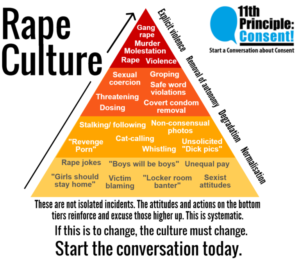Many of you may have seen the Facebook post that recently went viral sharing the story of a woman who indicated that she just “paid $400.00 to be raped…” Kara Burnham reported a sexual assault three years ago in Northern Idaho and was mistakenly charged for the forensic exam. I was tagged in the post and responded.
I so appreciate the courage it took for her to share her story so publicly. Since her post a number of dominoes are falling to ensure that this doesn’t happen again, including lawmakers on both sides of the aisle asking how to prevent a victim from being charged for a forensic exam. However, there is another question to answer as well as to why the alleged attacker was never charged.
According to RAIN (Rape, Abuse & Incest National Network),
“Every 98 seconds, another person is sexually assaulted.
Sexual violence affects hundreds of thousands of Americans each year. While we’re making progress — the number of assaults has fallen by more than half since 1993 — even today, only 6 out of every 1,000 rapists will end up in prison.”
Due to the stigma and shame the surrounds the crime, many victims won’t come forward. Add to that, a very complicated law enforcement system, fear of not being believed, low conviction rate, and stories in the media where large errors like this one occurs, and it’s no wonder why so few survivors formally report the crime.
Current law directs the “provider” to bill insurance for the forensic exam if it is readily available and if not, the bill goes to Idaho Crime Victims Compensation Fund, which is funded by federal dollars and court fines and fees. I think we can agree that fines and fees are the most sustainable choice for victim’s compensation and that we (the state) should fund this cost of doing business. A forensic exam is a tool used in the criminal justice system to hold a perpetrator accountable, thus insurance should not be involved nor should the victim be involved in the billing.
If a burglar broke into your home, do you expect to pay the police to take fingerprints? No. So why would we expect a victim of sexual assault to pay for a forensic exam used to collect evidence of a crime. It is a long and unpleasant and traumatizing experience. I am currently researching ways to fix this system and work with other lawmakers to recommend that state funding be used to cover this cost.
We must also put statewide protocols in place to create consistent standards to help people make sure things go the way they should. When we have a protocol, an agreement about procedures, we increase effective service and accountability if anyone operates outside the protocol. I will continue to work with the Idaho State Police and stakeholders to create and implement appropriate rules.
Knowing that this is one of the most under-reported crimes in our country (more than 80% go unreported) with epidemic levels against women and girls and people who are gender non-conforming, we must put resources not only into creating a fair, approachable, and accountable criminal justice process, but also (and more importantly) we must direct resources to changing the very culture of sexist and racist attitudes that props up and tolerates such high rates of violence against women.

Violence is on a continuum where values, attitudes and beliefs about gender relations lead to the devaluing of women and people who are gender non-conforming — that leads to more violence. If we are going to end physical acts of violence against women and people who are gender non-conforming, we need to end sexism, racism, homophobia, ableism, etc. Sexist attitudes, like women shouldn’t earn as much as men or women belong in the home raising kids or “no really means yes,” contribute to a culture that devalues and objectifies women. Once we devalue and objectify someone, it’s much easier to commit and justify acts of violence.
We must all work together to change the imbalance of power and to change the culture that props up and tolerates acts of physical and sexual violence. We must also change the laws to create systems where victims of sexual assault feel safe and feel believed when they come forward.
I will continue to work with stakeholder groups to move recommendations and possible legislation forward. Let’s work together to change the culture and change the law. Feel free to contact me with questions.
